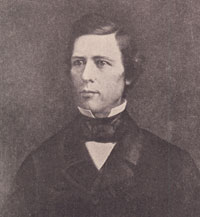
David Wilmot (1814-1868)
David Wilmot (January 20, 1814 - March 16, 1868) was a U.S. abolitionist and political figure. He was a sponsor and eponym of Wilmot Proviso which aimed to ban slavery in land gained from Mexico in 1846.
Born in Bethany, Pennsylvania, he studied at the academy at Aurora, New York and then studied law and was admitted to the bar of Bradford County, Pennsylvania. After practicing for some time in Towanda, Pennsylvania, he was elected as a Democrat to the 29th, 30th and 31st Congresses, serving from 1845 until 1851. He was not a candidate for renomination in 1850.
He was the author of the Wilmot Proviso relative to slavery in America's newly annexed territory and took a leading part in the founding of the United States Republican Party in 1854.
Although Wilmot favored the Walker Tariff, the Mexican-American War and other Democratic party measures, he opposed the extension of slavery. On August 8, 1846, when a bill was introduced appropriating $2 million to be used by the president in negotiating a treaty of peace with Mexico, Wilmot immediately offered the following amendment:
"Provided, That, as an express and fundamental condition to the acquisition of any territory from the Republic of Mexico by the United States, by virtue of any treaty which may be negotiated between them, and to the use by the Executive of the moneys herein appropriated, neither slavery nor involuntary servitude shall ever exist in any part of said territory, except for crime, whereof the party shall first be duly convicted."
The amendment, famous in American history as the Wilmot Proviso, was adopted by the United States House of Representatives, but was defeated, with the original bill, by the U.S. Senate's adjournment. A similar measure was brought forward at the next session, the appropriation, however, being increased to $3 million and the amendment being extended to include all territory which might be acquired by the United States; in this form it passed the House by a vote of 115 to 105; but the Senate refused to concur, passed a bill of its own without the amendment; and the House, owing largely to the influence of General Lewis Cass, in March 1847, receded from its position.
He was a presiding judge of the 13th Judicial District of Pennsylvania from 1851 to 1861, during which time (1857) he was an unsuccessful candidate for Governor of Pennsylvania. He was a delegate to the Republican National Conventions of 1856 and 1860.
In 1861 he was elected to the United States Senate to fill the seat of Simon Cameron and served in that body from 1861 until 1863.
He was also a member of the peace convention of 1861, held in Washington, D.C., in an effort to devise means to prevent the impending American Civil War; appointed by President Abraham Lincoln a judge of the United States Court of Claims in 1863 and served until his death in Towanda in 1868. He is interred in Riverside Cemetery.